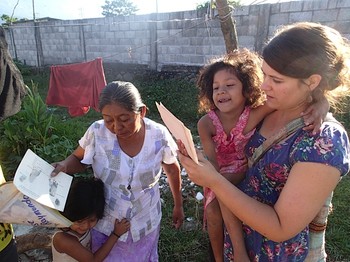I sat on the creaky couch with one arm wrapped around little Yazmina, bouncing contently on my lap, and the other sifting through the pile of documentation fanned out on an outdated floral cushion cover.
“OK, Señora, how old did you say she was? Your niece?” I asked the concerned woman next to me as she added a school record to the growing pile beside her.
“Fourteen. But they brought her when she was one.”
“To Florida?”
“To Florida.”
“And they have copies of her birth certificate and everything there?”
“Sí.”
It’s not the where I expected to find myself this morning when I left for a walk through Salvador Urbina, Chiapas. This quant coffee city in the mountains of southern Mexico seems galaxies away from my life on the U.S.-Mexican border—from the wall, the patrol, the politics.
The migration phenomenon
But here I am — sitting in a small cement home, surrounded by the sounds of roosters and giggly, barefoot little girls getting dressed for school — explaining Deferred Action for Childhood Arrivals (DACA) to the attentive elderly woman seated beside me.
She, like most residents of Salvador Urbina, knows little about the U.S. immigration policies profoundly affecting the lives of her family members thousands of miles away.
She clearly understands two things about her family in the U.S.: she loves them, and there’s something causing fear in their lives.
No family in the Salvador Urbina community remains untouched by the migration phenomenon. Maybe a niece, maybe a son, maybe a husband — but someone went north. Maybe he’s still there, maybe she came home. Necessity has carved holes in nearly every family tree.
But for some, staying home is now possible thanks to Café Justo.
Opportunities at home
For Salvador Urbina residents like Mundo, coffee farming is a way of life as well as life support. In the past, Mundo and the other coffee farmers in Urbina received a pittance for their crop, causing many to migrate. Mundo worked for two and a half years in Atlanta caring for golf courses in order to earn money.
Now he’s home.
Mundo is part of the Café Justo cooperative in Urbina that’s creating opportunities in place of migration. He’s producing high quality coffee and receiving a dignified wage for his work, a wage that not only helps put food on the table, but also helps put his daughter through nursing school.
The Salvador Urbina cooperative — made up of nearly 30 associate growers — has this effect on many families. Coffee farmers once faced with dismal options for earning a living wage are now partners in their own business, making collective decisions about their product.
Ten years in relationship
But even more impressive than the cooperative model is the fact that Café Justo just celebrated ten years in Salvador Urbina—and they celebrated in style!
I had the privilege of joining the visiting delegation of Café Justo supporters from the U.S. in the Tenth Aniversario party in Urbina. We even jumped in the preparations the day before, which meant blowing up balloons, slicing vegetables and making sure to fill the small Café Justo bodega with enough chairs and tables for all guests.
And when the party began, the sentiments of the growers and visitors came through the speakers clearly as we listened to speech after speech. They reminisced about the beginning of the cooperative—their hopes, their doubts, their excitement—and they marveled at the progress of ten years.
As we listened to the reflections, I looked around the packed bodega at the faces of the cooperative members and their families and friends while they nodded along with the speeches. The ten year connection between the U.S. supporters, the growers and the Urbina community was tangible in the celebration, reminding me just how impactful this unlikely relationship between a mountain town in Chiapas and some concerned U.S. citizens has been.
Accountable
The lives of all these families in Urbina, Mundo’s life and the life of the niece in Florida intertwine with mine. I can talk a good talk about us all being brothers and sisters in Christ, or each one made in God’s image, or whatever else they teach in Sunday school about who my neighbor is, but what does that actually mean?
I think it means I’m accountable. When I write my congressmen about the importance of immigration reform, it’s because of some folks I know and love whose families are far away in mountain towns, praying hard for their safety.
And when I buy coffee, I’m accountable to those who grew it. I buy Just Coffee because of some folks I know and love who should never have to migrate because of economic necessity.
We won’t all have the chance to sit on someone’s porch in Salvador Urbina and share a meal, a laugh and several hugs with our brothers and sisters there, but trust me, this is the kind of family you look out for — how beautiful that Café Justo is providing a way, a connection and a relationship between us.

